Burt A. The Evolution of the British Empire and Commonwealth From the American Revolution
Подождите немного. Документ загружается.

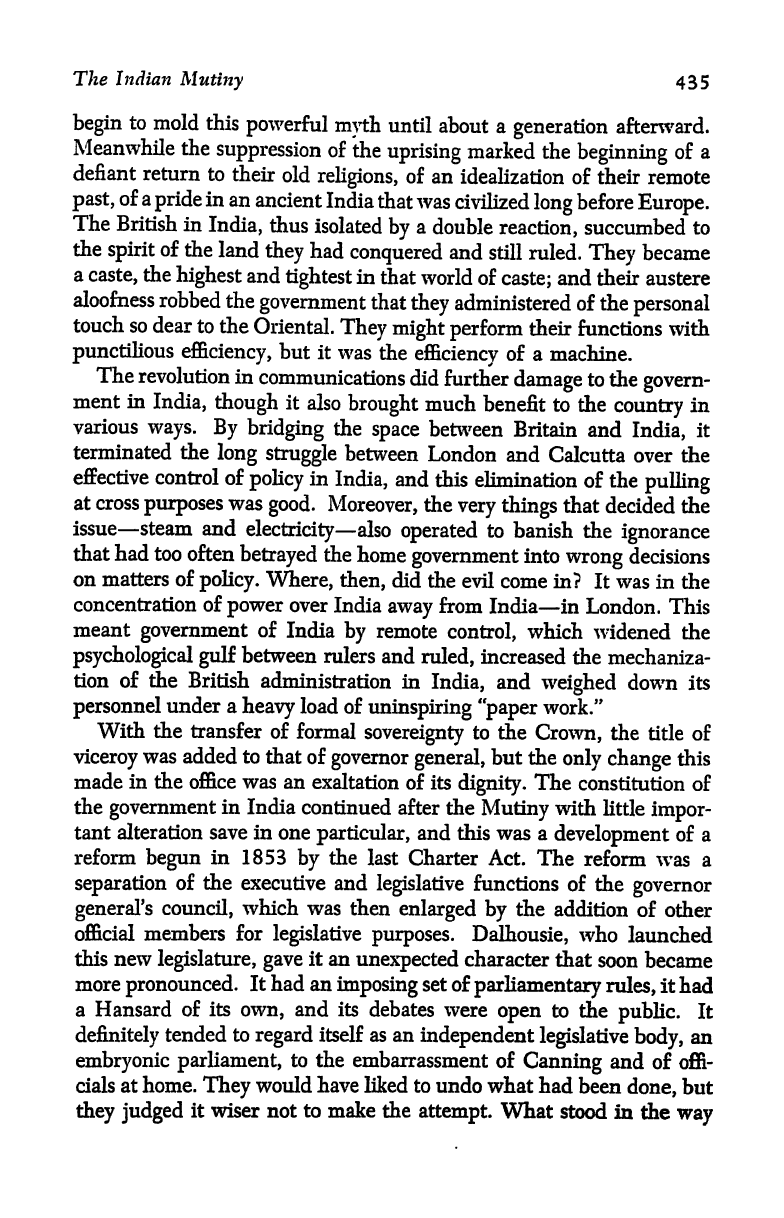
The
Indian
Mutiny
435
begin
to
mold
this
powerful
myth
until
about a
generation
afterward.
Meanwhile
the
suppression
of
the
uprising
marked
the
beginning
of
a
defiant
return
to
their
old
religions,
of
an
idealization of their
remote
past,
of a
pride
in
an
ancient
India
that
was
civilized
long
before
Europe.
The
British
in
India,
thus
isolated
by
a
double
reaction,
succumbed to
the
spirit
of
the
land
they
had
conquered
and
still ruled.
They
became
a
caste,
the
highest
and
tightest
in
that
world
of
caste;
and
their austere
aloofness
robbed
the
government
that
they
administered of the
personal
touch so dear
to the
Oriental.
They
might perform
their functions with
punctilious
efficiency,
but it
was
the
efficiency
of a
machine.
The
revolution
in
communications did
further
damage
to the
govern-
ment
in
India,
though
it
also
brought
much
benefit
to the
country
in
various
ways. By
bridging
the
space
between Britain
and
India,
it
terminated
the
long
struggle
between
London
and
Calcutta over the
effective
control of
policy
in
India,
and
this
elimination of the
pulling
at
cross
purposes
was
good.
Moreover,
the
very
things
that
decided
the
issue steam
and
electricity
also
operated
to
banish the
ignorance
that
had
too often
betrayed
the
home
government
into
wrong
decisions
on
matters
of
policy.
Where,
then,
did
the
evil come in?
It
was
in
the
concentration of
power
over
India
away
from
India in
London.
This
meant
government
of
India
by
remote
control,
which
widened the
psychological gulf
between
rulers
and
ruled,
increased
the
mechaniza-
tion of the
British
administration in
India,
and
weighed
down
its
personnel
under a
heavy
load of
uninspiring "paper
work."
With
the
transfer
of
formal
sovereignty
to the
Crown,
the
title of
viceroy
was
added
to
that
of
governor
general,
but
the
only
change
this
made
in the
office
was
an
exaltation
of
its
dignity.
The
constitution of
the
government
in India
continued after
the
Mutiny
with
little
impor-
tant
alteration save in
one
particular,
and this was a
development
of
a
reform
begun
in
1853
by
the
last
Charter Act.
The
reform
was a
separation
of
the
executive and
legislative
functions
of the
governor
general's
council,
which
was
then
enlarged by
the
addition of
other
official members for
legislative
purposes.
Dalhousie,
who
launched
this
new
legislature, gave
it an
unexpected
character that
soon
became
more
pronounced.
It had an
imposing
set of
parliamentary
rules,
it
had
a Hansard of
its
own,
and its
debates were
open
to the
public.
It
definitely
tended
to
regard
itself
as an
independent
legislative
body,
an
embryonic
parliament,
to the
embarrassment
of
Canning
and
of offi-
cials
at home.
They
would have liked to
undo what
had been
done,
but
they judged
it wiser
not
to make
the
attempt.
What
stood
in
the
way
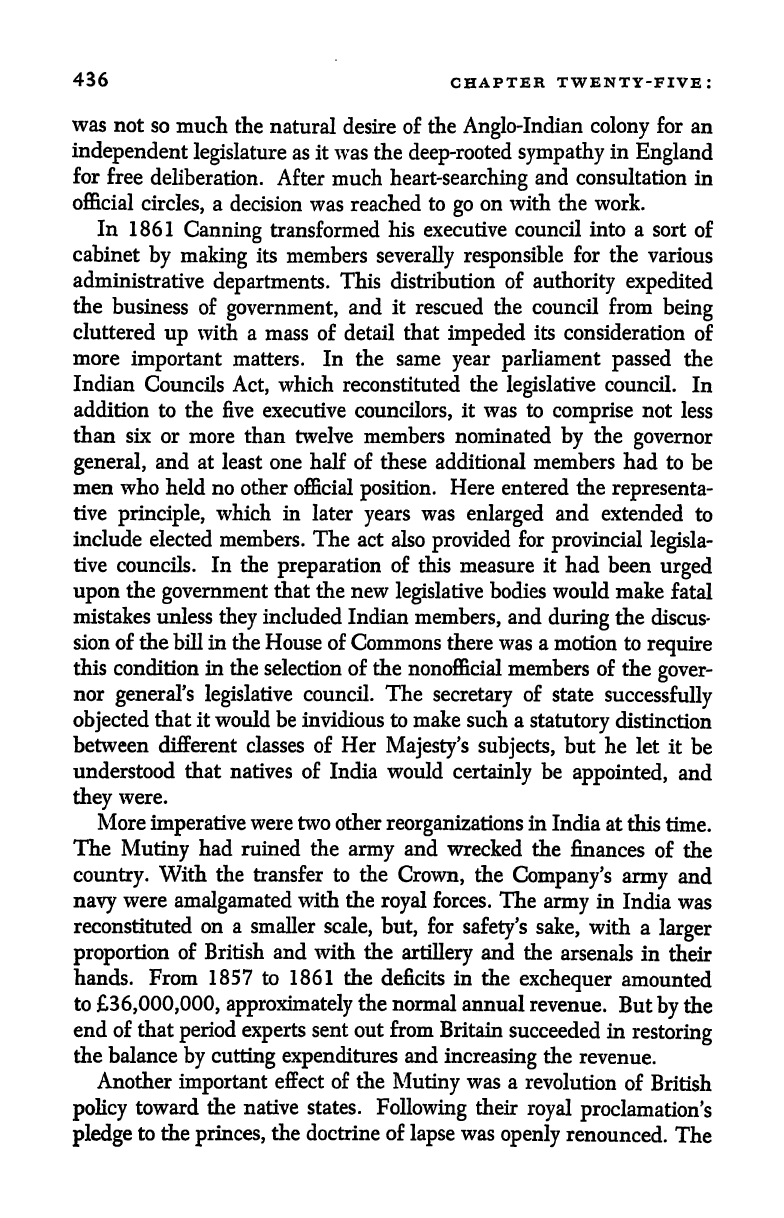
436
CHAPTER TWENTY-FIVE:
was not
so
much
the
natural desire of
the
Anglo-Indian
colony
for
an
independent
legislature
as it was the
deep-rooted
sympathy
in
England
for
free
deliberation.
After much
heart-searching
and
consultation
in
official
circles,
a
decision was
reached
to
go
on
with
the
work.
In
1861
Canning
transformed
his
executive
council into a
sort
of
cabinet
by
making
its
members
severally
responsible
for
the
various
administrative
departments.
This distribution
of
authority
expedited
the
business of
government,
and
it
rescued
the
council from
being
cluttered
up
with
a
mass of detail
that
impeded
its
consideration
of
more
important
matters. In the
same
year
parliament
passed
the
Indian
Councils
Act,
which reconstituted
the
legislative
council.
In
addition to
the five executive
councilors,
it was
to
comprise
not
less
than six
or more than twelve
members
nominated
by
the
governor
general,
and
at least one
half of
these
additional
members
had to
be
men who
held no other
official
position.
Here
entered
the
representa-
tive
principle,
which in later
years
was
enlarged
and
extended
to
include
elected
members.
The act also
provided
for
provincial
legisla-
tive councils. In the
preparation
of this measure
it
had
been
urged
upon
the
government
that the new
legislative
bodies
would make
fatal
mistakes
unless
they
included
Indian
members,
and
during
the
discus-
sion of the
bill
in
the House of
Commons
there
was
a
motion to
require
this
condition
in
the selection of the
nonofficial
members
of the
gover-
nor
general's
legislative
council.
The
secretary
of
state
successfully
objected
that
it would be invidious to make
such a
statutory
distinction
between
different classes of
Her
Majesty's
subjects,
but he
let
it
be
understood that natives
of India would
certainly
be
appointed,
and
they
were.
More
imperative
were
two
other
reorganizations
in
India
at
this
time.
The
Mutiny
had ruined the
army
and
wrecked the
finances
of
the
country.
With
the
transfer to the
Crown,
the
Company's
army
and
navy
were
amalgamated
with the
royal
forces. The
army
in
India
was
reconstituted
on a
smaller
scale, but,
for
safety's
sake,
with a
larger
proportion
of
British
and with the
artillery
and
the
arsenals in
their
hands.
From
1857
to
1861
the
deficits in
the
exchequer
amounted
to
36,000,000,
approximately
the normal
annual
revenue.
But
by
the
end
of
that
period experts
sent
out
from Britain
succeeded in
restoring
the
balance
by
cutting
expenditures
and
increasing
the
revenue.
Another
important
effect of the
Mutiny
was
a
revolution
of
British
policy
toward
the native
states.
Following
their
royal
proclamation's
pledge
to the
princes,
the doctrine of
lapse
was
openly
renounced.
The
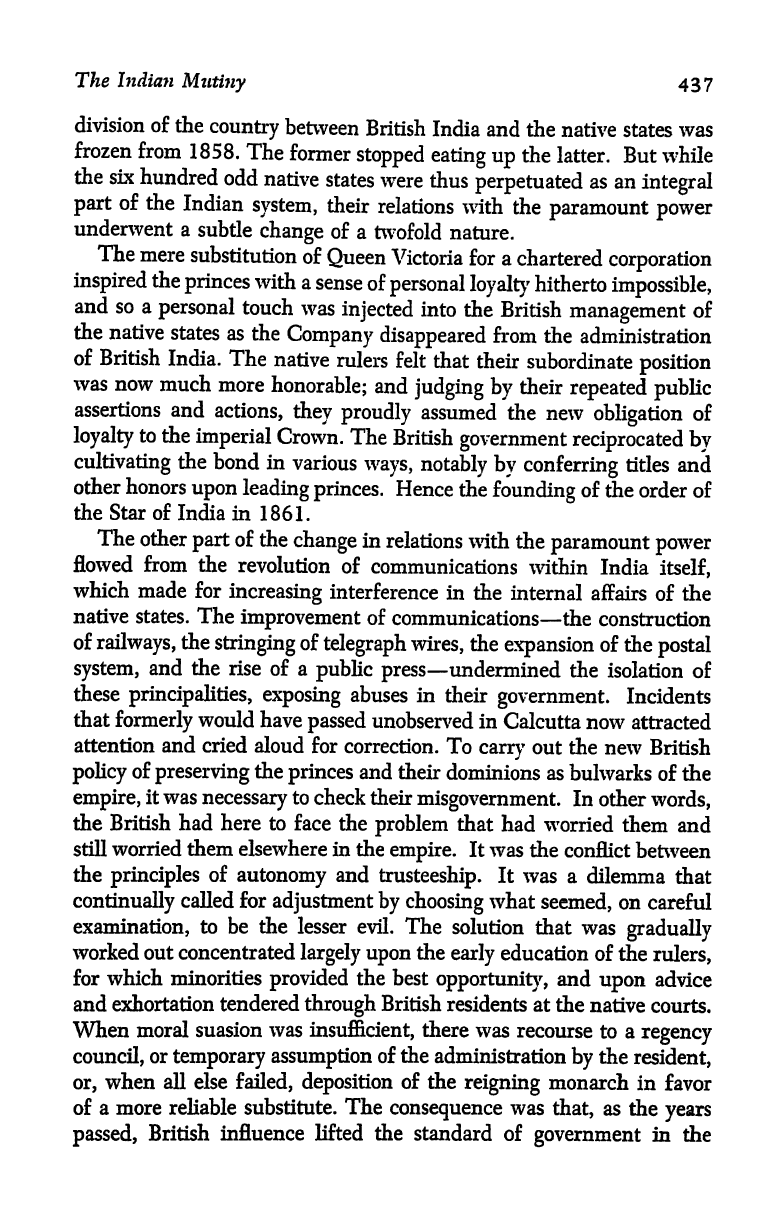
The
Indian
Mutiny 437
division of
the
country
between
British
India
and the native
states
was
frozen
from
1858.
The
former
stopped
eating up
the latter.
But while
the six
hundred
odd
native
states
were
thus
perpetuated
as an
integral
part
of
the
Indian
system,
their
relations with
the
paramount power
underwent
a
subtle
change
of
a
twofold nature.
The
mere
substitution
of
Queen
Victoria for a
chartered
corporation
inspired
the
princes
with
a
sense
of
personal
loyalty
hitherto
impossible,
and so
a
personal
touch
was
injected
into
the
British
management
of
the
native
states
as the
Company
disappeared
from the
administration
of British
India.
The
native
rulers felt
that
their
subordinate
position
was now
much
more
honorable;
and
judging
by
their
repeated
public
assertions
and
actions,
they
proudly
assumed
the new
obligation
of
loyalty
to
the
imperial
Crown.
The
British
government
reciprocated
by
cultivating
the
bond
in
various
ways,
notably by
conferring
titles
and
other honors
upon
leading princes.
Hence the
founding
of
the
order of
the Star of
India
in
1861.
The
other
part
of the
change
in
relations with
the
paramount
power
flowed from the
revolution
of
communications
within
India
itself,
which
made for
increasing
interference
in the
internal affairs
of the
native
states. The
improvement
of
communications the
construction
of
railways,
the
stringing
of
telegraph
wires,
the
expansion
of
the
postal
system,
and the rise
of
a
public
press
undermined the
isolation of
these
principalities,
exposing
abuses
in
their
government.
Incidents
that
formerly
would have
passed
unobserved
in
Calcutta now
attracted
attention and
cried aloud
for
correction.
To
carry
out
the
new
British
policy
of
preserving
the
princes
and
their
dominions
as
bulwarks
of the
empire,
it was
necessary
to
check their
misgovernment.
In
other
words,
the British
had here to
face the
problem
that
had
worried
them
and
still
worried
them
elsewhere in
the
empire.
It
was the
conflict
between
the
principles
of
autonomy
and
trusteeship.
It
was a
dilemma that
continually
called
for
adjustment
by
choosing
what
seemed,
on
careful
examination,
to be the lesser evil.
The
solution that
was
gradually
worked out
concentrated
largely upon
the
early
education of
the
rulers,
for
which minorities
provided
the best
opportunity,
and
upon
advice
and
exhortation tendered
through
British
residents
at
the
native
courts.
When
moral
suasion was
insufficient,
there
was
recourse
to
a
regency
council,
or
temporary
assumption
of the
administration
by
the
resident,
or,
when all else
failed,
deposition
of the
reigning
monarch
in
favor
of a more reliable substitute.
The
consequence
was
that,
as
the
years
passed,
British
influence lifted
the
standard of
government
in
the
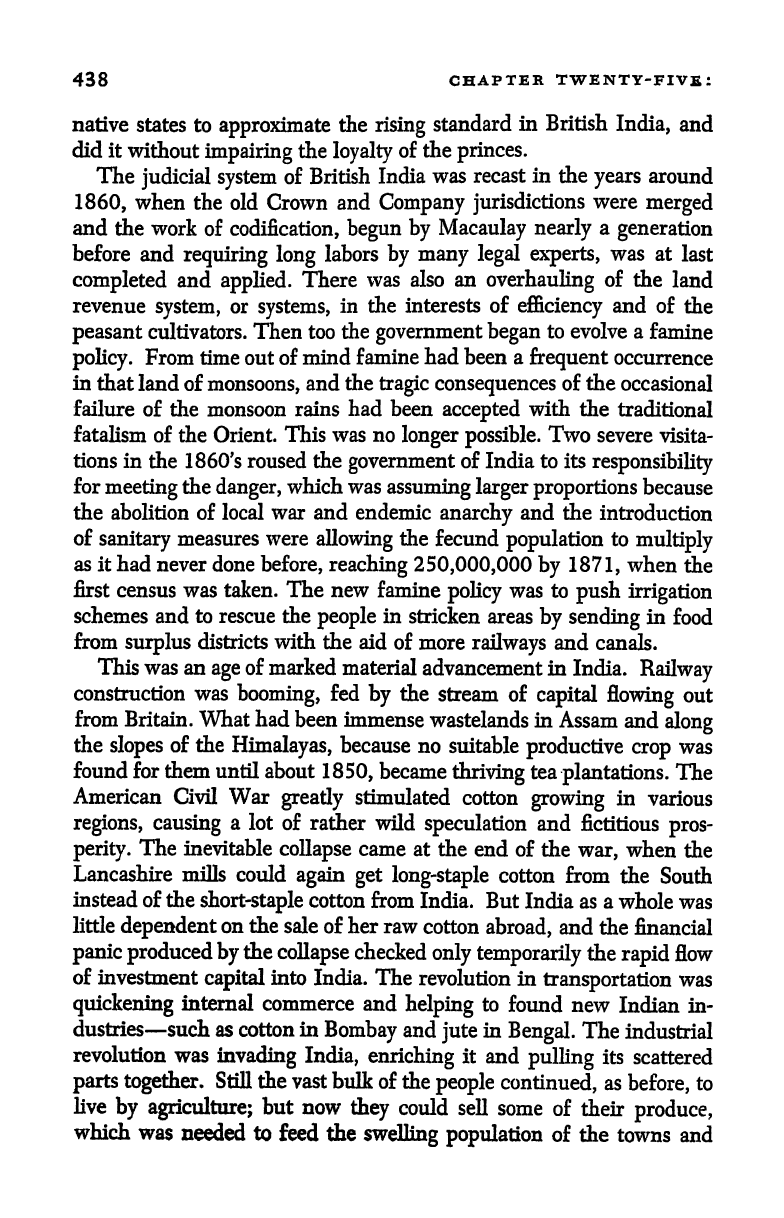
438
CHAPTER TWENTY-FIVE:
native
states
to
approximate
the
rising
standard
in British
India,
and
did it
without
impairing
the
loyalty
of the
princes.
The
judicial system
of British
India
was
recast
in
the
years
around
1860,
when the
old
Crown
and
Company
jurisdictions
were
merged
and the work
of
codification,
begun
by
Macaulay nearly
a
generation
before
and
requiring long
labors
by
many legal experts,
was
at
last
completed
and
applied.
There
was
also
an
overhauling
of the
land
revenue
system,
or
systems,
in
the interests of
efficiency
and
of
the
peasant
cultivators.
Then
too
the
government began
to
evolve
a
famine
policy.
From
time out of
mind famine
had
been
a
frequent
occurrence
in
that
land of
monsoons,
and
the
tragic
consequences
of
the
occasional
failure
of
the monsoon rains had
been
accepted
with
the
traditional
fatalism of
the Orient.
This was no
longer possible.
Two severe
visita-
tions in
the
1860's roused the
government
of India to its
responsibility
for
meeting
the
danger,
which was
assuming larger
proportions
because
the abolition of
local war and endemic
anarchy
and the
introduction
of
sanitary
measures were
allowing
the
fecund
population
to
multiply
as
it
had
never
done
before,
reaching
250,000,000
by
1871,
when
the
first census was
taken.
The
new
famine
policy
was
to
push
irrigation
schemes
and
to rescue the
people
in
stricken
areas
by
sending
in
food
from
surplus
districts
with
the
aid of
more
railways
and
canals.
This
was an
age
of marked
material
advancement in
India.
Railway
construction
was
booming,
fed
by
the
stream
of
capital
flowing
out
from Britain. What
had
been
immense
wastelands
in
Assam
and
along
the
slopes
of
the
Himalayas,
because
no suitable
productive
crop
was
found
for them
until about
1850,
became
thriving
tea
plantations.
The
American Civil War
greatly
stimulated cotton
growing
in
various
regions, causing
a lot
of
rather
wild
speculation
and
fictitious
pros-
perity.
The inevitable
collapse
came
at the
end of
the
war,
when the
Lancashire mills
could
again get
long-staple
cotton
from
the South
instead of
the
short-staple
cotton
from India. But
India as a
whole was
little
dependent
on
the
sale of her raw
cotton
abroad,
and
the
financial
panic
produced
by
the
collapse
checked
only
temporarily
the
rapid
flow
of investment
capital
into India. The
revolution
in
transportation
was
quickening
internal commerce
and
helping
to
found new
Indian
in-
dustries
such as cotton in
Bombay
and
jute
in
Bengal.
The
industrial
revolution
was
invading
India,
enriching
it
and
pulling
its
scattered
parts
together.
Still the
vast bulk
of
the
people
continued,
as
before,
to
live
by
agriculture;
but now
they
could sell
some
of
their
produce,
which
was
needed
to
feed the
swelling
population
of
the
towns
and
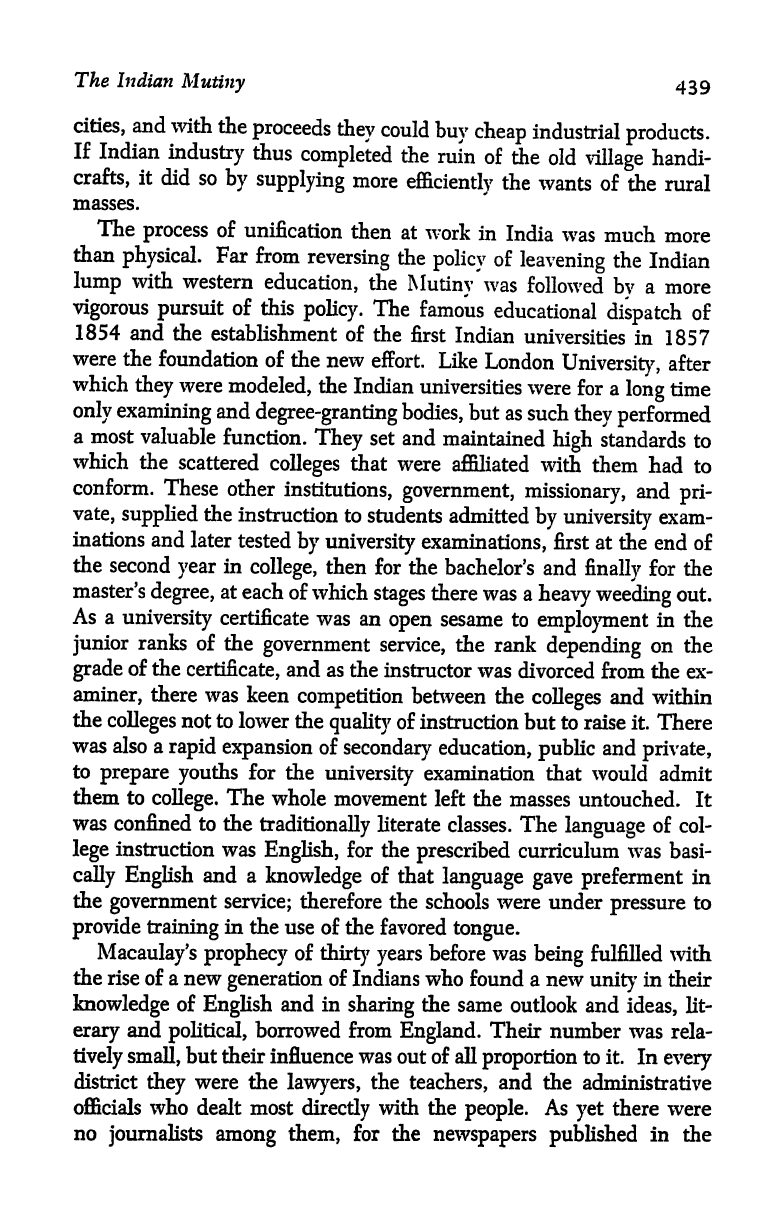
The Indian
Mutiny
439
cities,
and
with
the
proceeds
they
could
buy
cheap
industrial
products.
If Indian
industry
thus
completed
the
ruin
of
the
old
village
handi-
crafts,
it
did so
by
supplying
more
efficiently
the
wants
of
the rural
masses.
The
process
of
unification
then
at
work
in
India
was
much
more
than
physical.
Far
from
reversing
the
policy
of
leavening
the
Indian
lump
with
western
education,
the
Mutiny
was
followed
by
a
more
vigorous
pursuit
of
this
policy.
The
famous
educational
dispatch
of
1854
and
the
establishment
of
the
first
Indian
universities
in
1857
were
the
foundation
of
the new
effort.
Like
London
University,
after
which
they
were
modeled,
the
Indian
universities
were
for
a
long
time
only
examining
and
degree-granting
bodies,
but
as
such
they
performed
a
most
valuable
function.
They
set
and
maintained
high
standards
to
which
the
scattered
colleges
that
were
affiliated
with them
had to
conform.
These
other
institutions,
government,
missionary,
and
pri-
vate,
supplied
the
instruction to
students
admitted
by
university
exam-
inations
and later
tested
by
university
examinations,
first at
the
end of
the
second
year
in
college,
then
for
the
bachelor's
and
finally
for the
master's
degree,
at
each
of
which
stages
there was a
heavy
weeding
out.
As a
university
certificate
was
an
open
sesame
to
employment
in
the
junior
ranks of
the
government
service,
the rank
depending
on the
grade
of
the
certificate,
and as
the
instructor
was
divorced
from the ex-
aminer,
there
was
keen
competition
between
the
colleges
and within
the
colleges
not
to
lower
the
quality
of
instruction
but to
raise
it. There
was also a
rapid
expansion
of
secondary
education,
public
and
private,
to
prepare youths
for the
university
examination
that
would admit
them
to
college.
The
whole
movement
left
the
masses
untouched. It
was
confined
to the
traditionally
literate
classes.
The
language
of
col-
lege
instruction
was
English,
for the
prescribed
curriculum
was basi-
cally
English
and
a
knowledge
of
that
language
gave
preferment
in
the
government
service;
therefore
the
schools were
under
pressure
to
provide
training
in the
use
of the
favored
tongue.
Macaulay's
prophecy
of
thirty years
before
was
being
fulfilled
with
the
rise of a new
generation
of
Indians who
found a new
unity
in their
knowledge
of
English
and
in
sharing
the
same
outlook
and
ideas,
lit-
erary
and
political,
borrowed
from
England.
Their
number
was rela-
tively
small,
but their influence was
out
of all
proportion
to it.
In
every
district
they
were
the
lawyers,
the
teachers,
and the
administrative
officials who dealt
most
directly
with
the
people.
As
yet
there
were
no
journalists
among
them,
for the
newspapers
published
in
the

440
CHAPTER
TWENTY-FIVE
country
were
all written
by
Englishmen
for
Englishmen
and
were
scarcely
read
by
Indians.
But the
time
was
near
at
hand in
the
seventies
when the
rise of a
native
press
would
magnify
the
influence
of
the
Indian
minority
who had
imbibed
a
western
education.
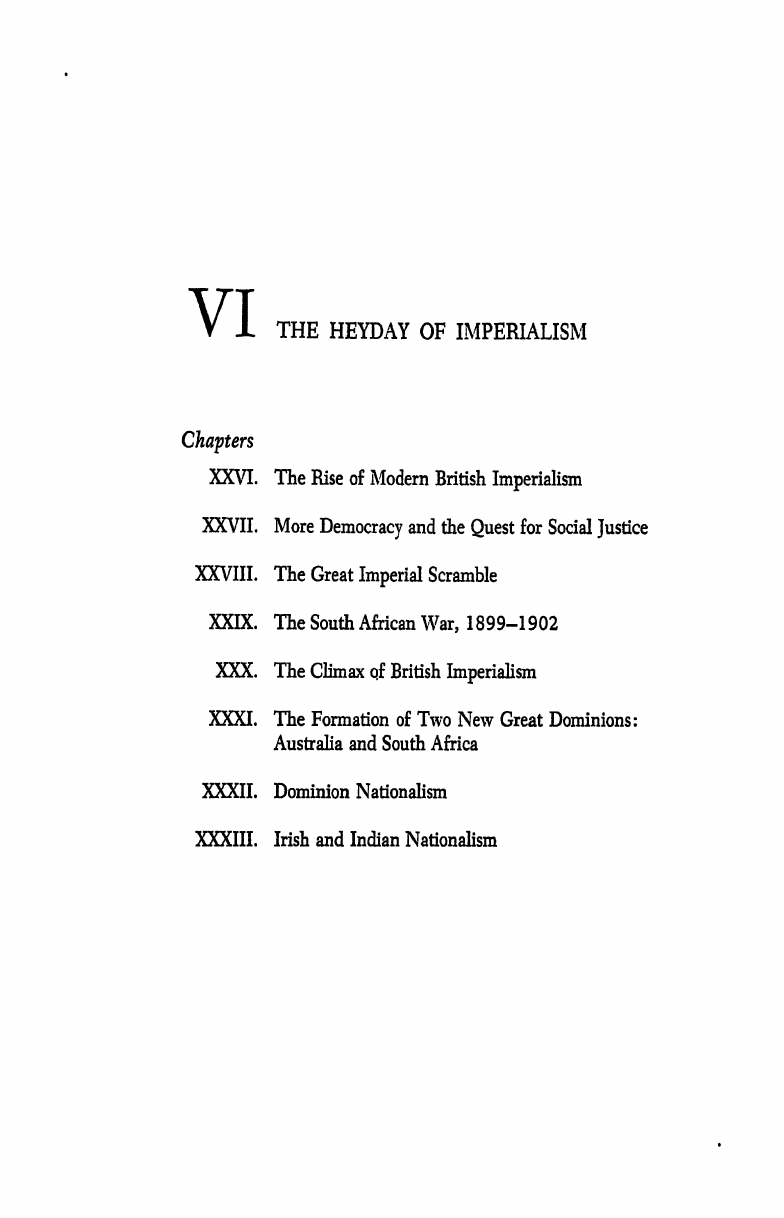
VI
THE
HEYDAY
OF
IMPERIALISM
Chapters
XXVI. The
Rise of
Modern British
Imperialism
XXVII.
More
Democracy
and the
Quest
for
Social
Justice
XXVIII.
The Great
Imperial
Scramble
XXIX.
The
South
African
War,
1
899-1 902
XXX. The
Climax
qf
British
Imperialism
XXXI.
The Formation
of
Two New
Great Dominions:
Australia
and South Africa
XXXII.
Dominion Nationalism
XXXIII. Irish
and
Indian
Nationalism

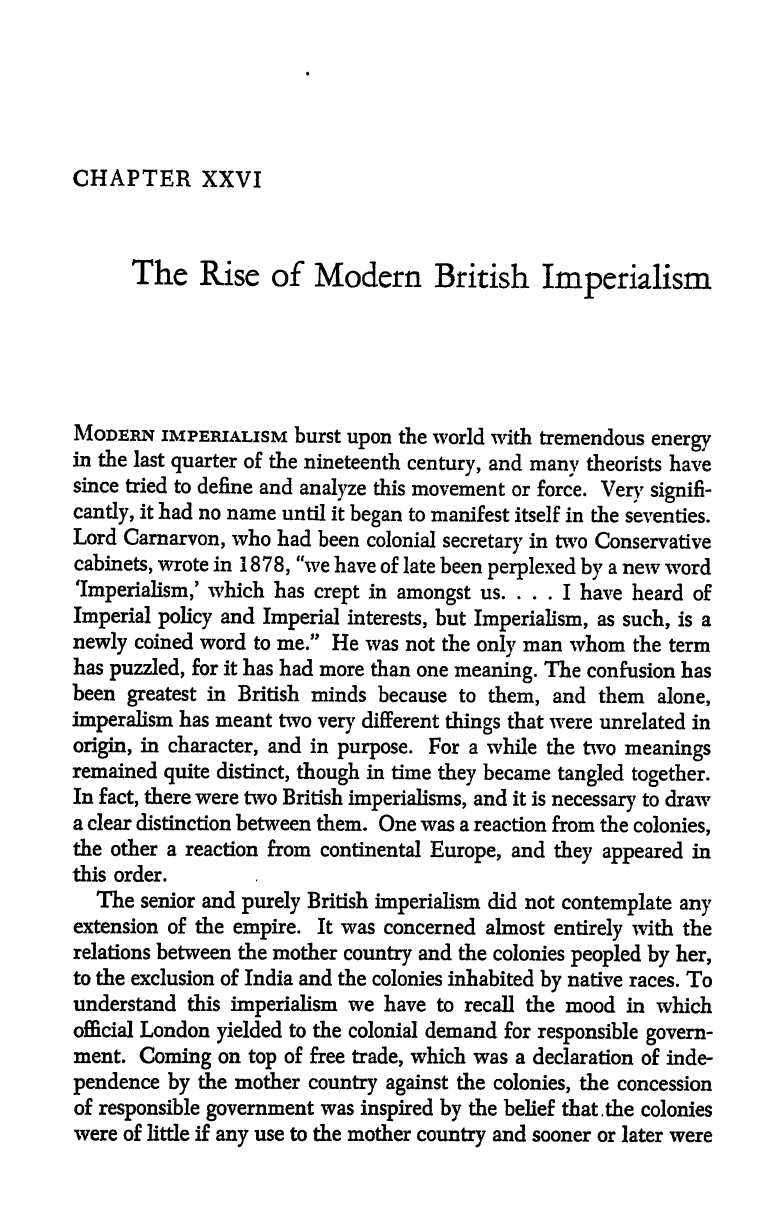
CHAPTER
XXVI
The
Rise
of
Modern
British
Imperialism
MODERN
IMPERIALISM
burst
upon
the
world
with
tremendous
energy
in
the
last
quarter
of
the
nineteenth
century,
and
many
theorists
have
since
tried
to
define
and
analyze
this
movement
or
force.
Very
signifi-
cantly,
it
had
no
name
until it
began
to
manifest
itself in
the
seventies.
Lord
Carnarvon,
who
had
been
colonial
secretary
in
two
Conservative
cabinets,
wrote
in 1
878,
"we
have
of
late
been
perplexed
by
a
new
word
'Imperialism/
which
has
crept
in
amongst
us. ...
I
have
heard
of
Imperial
policy
and
Imperial
interests,
but
Imperialism,
as
such,
is
a
newly
coined
word
to me."
He
was
not
the
only
man
whom the
term
has
puzzled,
for it
has
had
more
than one
meaning.
The
confusion
has
been
greatest
in
British
minds
because
to
them,
and them
alone,
imperalism
has meant
two
very
different
things
that were
unrelated in
origin,
in
character,
and in
purpose.
For a
while
the
two
meanings
remained
quite
distinct,
though
in
time
they
became
tangled
together.
In
fact,
there
were
two British
imperialisms,
and
it
is
necessary
to draw
a
clear
distinction
between
them.
One was a
reaction
from
the
colonies,
the
other a
reaction from
continental
Europe,
and
they
appeared
in
this order.
The
senior and
purely
British
imperialism
did not
contemplate
any
extension
of
the
empire.
It
was
concerned
almost
entirely
with the
relations
between the
mother
country
and
the colonies
peopled
by
her,
to the
exclusion of India
and the colonies
inhabited
by
native
races.
To
understand this
imperialism
we have
to
recall
the
mood
in
which
official
London
yielded
to the
colonial
demand for
responsible
govern-
ment.
Coming
on
top
of free
trade,
which
was a
declaration of
inde-
pendence by
the
mother
country
against
the
colonies,
the
concession
of
responsible
government
was
inspired by
the
belief
that.
the
colonies
were of little if
any
use
to the mother
country
and sooner
or
later were
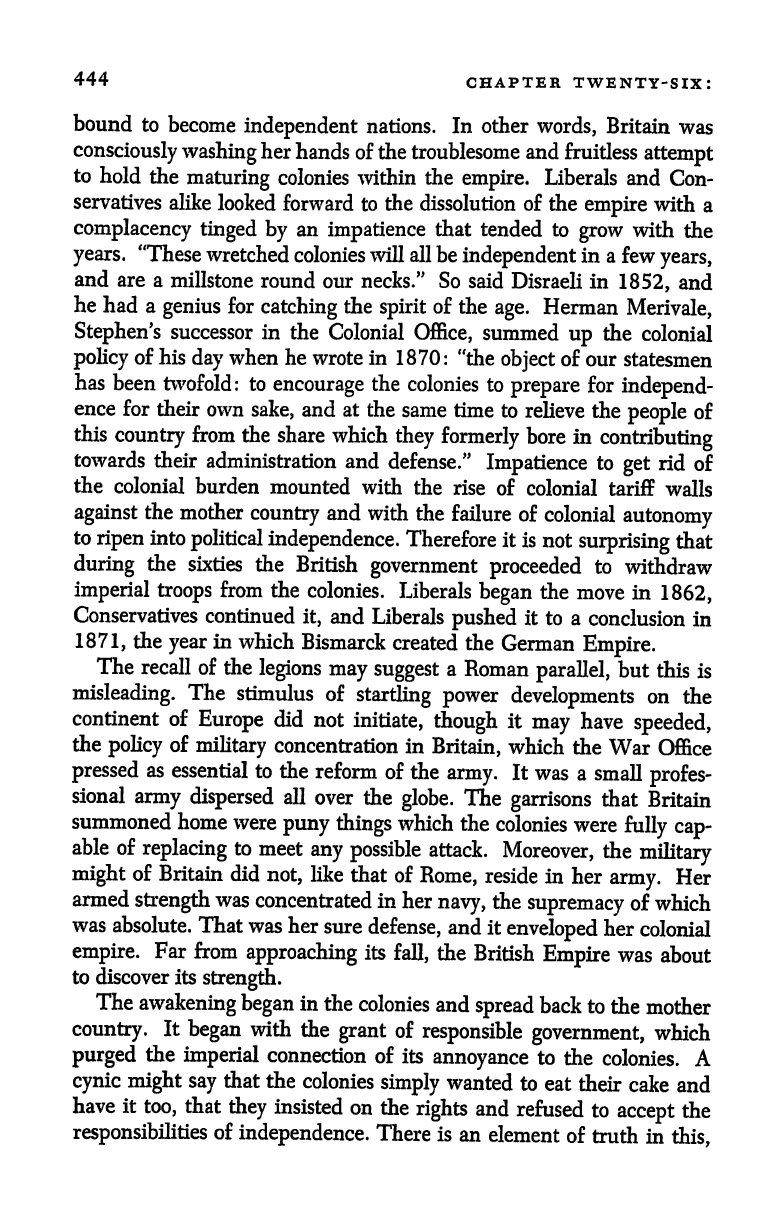
444
CHAPTER
TWENTY-SIX:
bound
to
become
independent
nations.
In
other
words,
Britain
was
consciously
washing
her
hands of the
troublesome and
fruitless
attempt
to
hold
the
maturing
colonies
within
the
empire.
Liberals
and
Con-
servatives
alike
looked forward
to
the
dissolution
of
the
empire
with
a
complacency
tinged by
an
impatience
that
tended
to
grow
with
the
years.
"These
wretched colonies will all be
independent
in a
few
years,
and are
a
millstone
round our necks." So
said
Disraeli
in
1852,
and
he
had
a
genius
for
catching
the
spirit
of
the
age.
Herman
Merivale,
Stephen's
successor in
the
Colonial
Office,
summed
up
the
colonial
policy
of
his
day
when he
wrote
in 1870:
"the
object
of
our
statesmen
has
been
twofold: to
encourage
the
colonies
to
prepare
for
independ-
ence
for
their
own
sake,
and
at
the
same
time
to relieve
the
people
of
this
country
from the
share
which
they
formerly
bore in
contributing
towards
their
administration
and
defense."
Impatience
to
get
rid
of
the
colonial burden
mounted with
the
rise
of
colonial tariff
walls
against
the mother
country
and with
the
failure
of
colonial
autonomy
to
ripen
into
political
independence.
Therefore it
is
not
surprising
that
during
the
sixties
the
British
government
proceeded
to
withdraw
imperial
troops
from the
colonies.
Liberals
began
the
move in
1862,
Conservatives
continued
it,
and
Liberals
pushed
it to a
conclusion in
1871,
the
year
in
which
Bismarck
created
the
German
Empire.
The
recall of
the
legions
may
suggest
a
Roman
parallel,
but
this
is
misleading.
The
stimulus
of
startling power
developments
on
the
continent
of
Europe
did
not
initiate,
though
it
may
have
speeded,
the
policy
of
military
concentration in
Britain,
which the
War
Office
pressed
as
essential to
the
reform
of the
army.
It
was a
small
profes-
sional
army dispersed
all
over
the
globe.
The
garrisons
that
Britain
summoned home
were
puny
things
which
the
colonies
were
fully
cap-
able of
replacing
to
meet
any possible
attack.
Moreover,
the
military
might
of Britain
did
not,
like
that
of
Rome,
reside in
her
army.
Her
armed
strength
was
concentrated in
her
navy,
the
supremacy
of
which
was
absolute.
That
was her
sure
defense,
and it
enveloped
her
colonial
empire.
Far
from
approaching
its
fall,
the
British
Empire
was
about
to discover its
strength.
The
awakening
began
in
the
colonies
and
spread
back
to
the
mother
country.
It
began
with
the
grant
of
responsible
government,
which
purged
the
imperial
connection
of
its
annoyance
to
the
colonies.
A
cynic
might say
that
the
colonies
simply
wanted to
eat
their
cake
and
have
it
too,
that
they
insisted
on
the
rights
and
refused
to
accept
the
responsibilities
of
independence.
There
is
an
element
of
truth
in
this,
